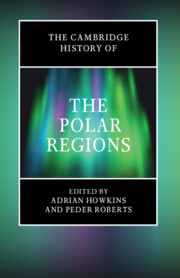Book contents
- The Cambridge History of the Polar Regions
- The Cambridge History of the Polar Regions
- Copyright page
- Contents
- Figures
- Contributors
- Acknowledgements
- Additional material
- 1 Introduction: The Problems of Polar History
- 2 ‘I Watch to See How the Land Is Changing’: An Inuit Perspective on Changing Environments and Cultural Resilience in the Western Canadian Arctic
- 3 Evolution of the Antarctic Continent and Its Ice Sheet
- 4 The Initial Peopling of the Circumpolar North
- 5 Archaeology, Politics, and Sámi Heritage
- 6 The Norse Settlement of Greenland
- 7 Russia, the First Arctic Empire, 1000–1917
- 8 The Discovery of Antarctica from Ptolemy to Shackleton
- 9 Sir John Franklin and the Northwest Passage in Myth and Memory
- 10 The Heroic Age of Antarctic Exploration, 1890 to the Present
- 11 Representing the Polar Regions through Historical Fiction
- 12 Geography, Anthropology, and Arctic Knowledge-Making
- 13 Britain’s Polar Empire, 1769–1982
- 14 Canada and the High Arctic Islands, 1880–1950
- 15 The Genesis of the Spitsbergen/Svalbard Treaty, 1871–1920
- 16 Industrial Whaling in the Arctic and Antarctic
- 17 A Historical Archaeology of the First Antarctic Labourers (Nineteenth Century)
- 18 Mining and Colonialism in the Circumpolar North
- 19 Creating the Soviet Arctic, 1917–1991
- 20 Greenland: From Colony to Self-government, 1721–2021
- 21 Cold War Environmental Knowledge in the Polar Regions
- 22 The International Geophysical Year and the Antarctic Treaty System
- 23 The First Century of US Militarization in Alaska, 1867–1967
- 24 Petroleum Development and the State in Arctic North America, 1919–1977
- 25 The Rise of Circumpolar Political Movements
- 26 The History of Polar Environmental Governance
- 27 The Antarctic Extension of Latin America
- 28 Moving Muskoxen as an Arctic Resource in the Twentieth Century
- 29 Boundaries of Place and Time at the Edge of the Polar Oceans
- 30 Re-storying from Within: Renewing Relationships Beyond the Shadows of Polar History
- 31 Conclusion: Time, and the Future of Polar History
- Index
- References
12 - Geography, Anthropology, and Arctic Knowledge-Making
Published online by Cambridge University Press: 24 March 2023
- The Cambridge History of the Polar Regions
- The Cambridge History of the Polar Regions
- Copyright page
- Contents
- Figures
- Contributors
- Acknowledgements
- Additional material
- 1 Introduction: The Problems of Polar History
- 2 ‘I Watch to See How the Land Is Changing’: An Inuit Perspective on Changing Environments and Cultural Resilience in the Western Canadian Arctic
- 3 Evolution of the Antarctic Continent and Its Ice Sheet
- 4 The Initial Peopling of the Circumpolar North
- 5 Archaeology, Politics, and Sámi Heritage
- 6 The Norse Settlement of Greenland
- 7 Russia, the First Arctic Empire, 1000–1917
- 8 The Discovery of Antarctica from Ptolemy to Shackleton
- 9 Sir John Franklin and the Northwest Passage in Myth and Memory
- 10 The Heroic Age of Antarctic Exploration, 1890 to the Present
- 11 Representing the Polar Regions through Historical Fiction
- 12 Geography, Anthropology, and Arctic Knowledge-Making
- 13 Britain’s Polar Empire, 1769–1982
- 14 Canada and the High Arctic Islands, 1880–1950
- 15 The Genesis of the Spitsbergen/Svalbard Treaty, 1871–1920
- 16 Industrial Whaling in the Arctic and Antarctic
- 17 A Historical Archaeology of the First Antarctic Labourers (Nineteenth Century)
- 18 Mining and Colonialism in the Circumpolar North
- 19 Creating the Soviet Arctic, 1917–1991
- 20 Greenland: From Colony to Self-government, 1721–2021
- 21 Cold War Environmental Knowledge in the Polar Regions
- 22 The International Geophysical Year and the Antarctic Treaty System
- 23 The First Century of US Militarization in Alaska, 1867–1967
- 24 Petroleum Development and the State in Arctic North America, 1919–1977
- 25 The Rise of Circumpolar Political Movements
- 26 The History of Polar Environmental Governance
- 27 The Antarctic Extension of Latin America
- 28 Moving Muskoxen as an Arctic Resource in the Twentieth Century
- 29 Boundaries of Place and Time at the Edge of the Polar Oceans
- 30 Re-storying from Within: Renewing Relationships Beyond the Shadows of Polar History
- 31 Conclusion: Time, and the Future of Polar History
- Index
- References
Summary
The Arctic is a region that has been understood very much through its environment. Issues of nature and environment have been central themes investigated by both anthropologists and geographers. Much canonical work by geographers and anthropologists has focused on investigating environmental and cultural interactions, using concepts such as landscape, site, or place. The academic disciplines of geography and anthropology have therefore contributed to the process of making Arctics. This chapter examines these contentions.
- Type
- Chapter
- Information
- The Cambridge History of the Polar Regions , pp. 279 - 301Publisher: Cambridge University PressPrint publication year: 2023



